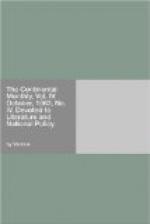THE FREEDOM OF THE PRESS.
An important discussion has arisen since the commencement of the war, bearing upon the interests of the American Press. The Government has seen fit, at various times, through its authorities, civil and military, to suppress the circulation and even the publication of journals which, in its judgment, gave aid and comfort to the enemy, either by disloyal publications in reference to our affairs, or by encouraging and laudatory statements concerning the enemy. The various papers of the country have severally censured or commended the course of the Government in this matter, and the issue between the Press and the Authorities has been regarded as of a sufficiently serious nature to demand a convocation of editors to consider the subject; of which convention Horace Greeley was chairman. A few remarks on the nature of the liberty of the press and on its relations to the governing powers will not, therefore, at this time, be inopportune.
Men are apt, at times, in the excitement of political partisanship, to forget that the freedom of the press is, like all other social liberty, relative and not absolute; that it is not license to publish whatsoever they please, but only that which is within certain defined limits prescribed by the people as the legitimate extent to which expression through the public prints should be permitted; and that it is because these limits are regulated by the whole people, for the whole people, and not by the arbitrary caprice of a single individual or of an aristocracy, that the press is denominated free. Let it be remembered, then, as a starting point, that the press is amenable to the people; that it is controlled and regulated by them, and indebted to them for whatever measure of freedom it enjoys.
The scope of this liberty is carefully defined by the statutes, as also the method by which its transgression is to be punished. These enactments minutely define the nature of an infringement of their provisions, and point out the various methods of procedure in order to redress private grievance or to punish public wrong, in such instances. These statutes emanate from the people, are the expression of their will, and in consonance with them the action of the executive authorities must proceed, whenever the civil law is sufficient for the execution of legal measures.
But there comes a time, in the course of a nation’s existence, when the usual and regular methods of its life are interrupted; when peaceful systems and civilized adaptations are forced to give place to the ruder and more peremptory modes of procedure which belong to seasons of hostile strife. The slow, methodical, oftentimes tedious contrivances of ordinary law, admirably adapted for periods of national quietude, are utterly inadequate to the stern and unforeseen contingencies of civil war. Laws which are commonly sufficient to secure justice and afford protection, are then




